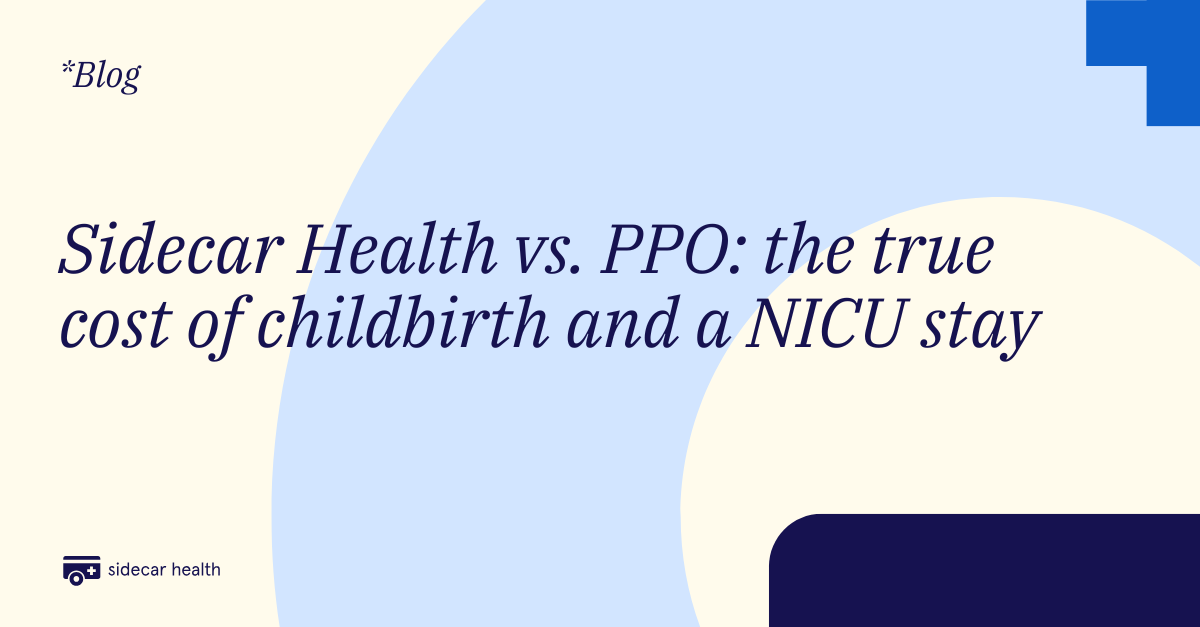
Bringing a baby into the world should be joyful. But when something unexpected happens — a premature delivery, a medical complication, or a stay in the neonatal intensive care unit (NICU) — families often face a second wave of shock: the bill.
Let’s follow one family through the same event — a premature birth that leads to an unexpected NICU stay — and see how their experience would look under two different health plans: a traditional PPO and Sidecar Health.
Scenario
Event: A mother goes into labor three weeks early. The baby experiences complications and spends a week in the NICU
Hospital: In-network facility (for the PPO plan. Sidecar Health has no networks and members always have an option at or below the plan’s allowed amount)
NICU Costs: $70,000 (typical for a week-long stay)
Delivery Costs: $15,000 (routine labor and delivery)
Total: $85,000
The traditional PPO experience
On a mid-tier PPO, here’s what the financial picture would look like:
- $4,000 family deductible
- 20% coinsurance after deductible
- $16,000 out-of-pocket maximum
Even though the care is in-network — and even with federal “No Surprises Act” protection — the family can still owe a substantial amount of money.
Hospital & provider charges
| Service | Cost | What family owes |
| Labor & delivery | $15,000 | $4,000 (family deductible + 20% coinsurance) = $6,200 |
| NICU care (7 days) | $70,000 | $14,000 (20% coinsurance) (reduced to $9,800 due to family OOP max) |
| Total | $85,000 | $16,000 |
The reality: Even when the plan works exactly as intended, the family still faces a $16,000 bill — on top of the stress of a newborn in the NICU.
The Sidecar Health experience
Sidecar Health is designed for moments like this — when life doesn’t follow the plan.
Members have one simple out-of-pocket maximum — their deductible. When unplanned care happens during a planned procedure, like a NICU stay after childbirth, they’re protected from any additional costs beyond that deductible.
There are no surprise bills and no confusing layers of coinsurance. Just clear, predictable coverage that works the way it should — even when life doesn’t go according to plan.
Here’s how the same scenario unfolds with Sidecar Health:
Hospital & provider charges
| Service | Actual cost | What Sidecar Health pays | What member owes |
| Labor & delivery | $15,000 | Covered after deductible | $4,000 deductible |
| NICU Care (7 days) | $70,000 | Covered in full (unplanned care during planned event protection) | $0 |
| Total | $85,000 | $81,000 paid by Sidecar Health | $4,000 (deductible only) |
The difference: Because the NICU stay is unplanned care that occurs during a planned event, Sidecar Health covers it in full — protecting members from any costs above their deductible and eliminating the financial uncertainty families often face under traditional insurance.
Side-by-side comparison
| Traditional PPO | Sidecar Health | |
| Family deductible | $4,000 | $4,000 |
| Coinsurance | $12,000 | $0 |
| Total member cost | $16,000 | $4,000 |
| Transparency | Limited to none | Full cost visibility before care |
The bottom line
When a baby needs critical care, no parent should have to stress about finances. With Sidecar Health, members aren’t punished for what can’t be predicted — they get coverage that reflects how care actually happens, with clarity, protection, and peace of mind. Because a system that’s supposed to protect families shouldn’t bankrupt them.
All dollar amounts shown are estimates for illustrative purposes only. Actual costs and benefits may vary by provider, market, and individual plan design. Sidecar Health doesn’t use provider networks; instead, the plan pays the average local cost of care for services. Members choose to see whatever provider they want knowing they can share in the savings or be responsible for costs that exceed what the plan pays. The unplanned care protection applies in either case.


